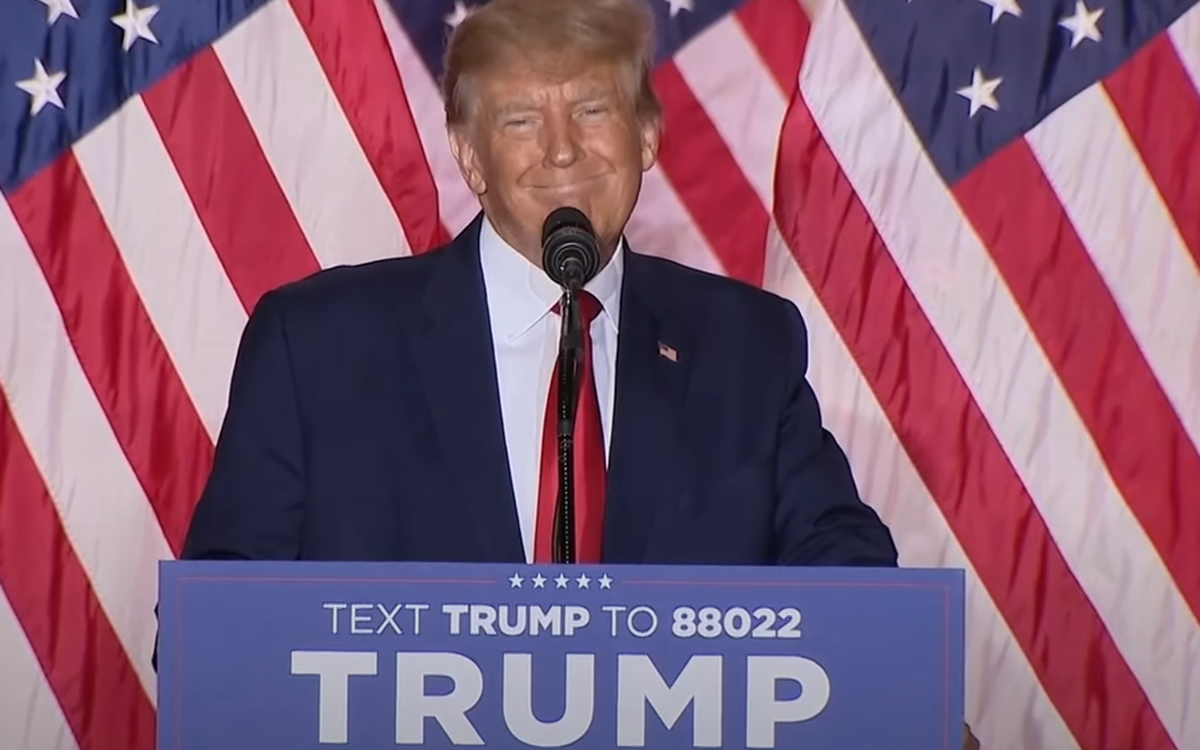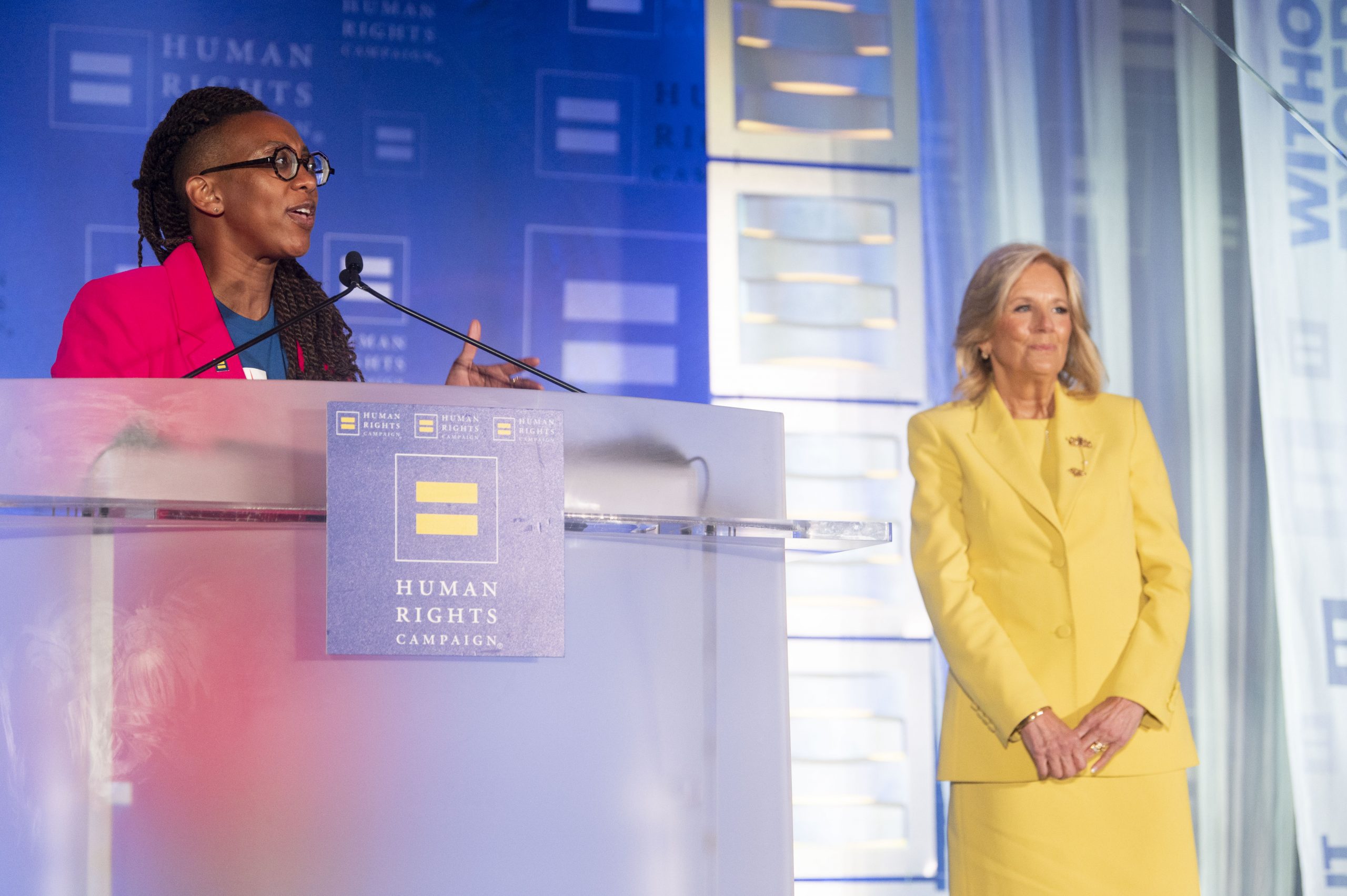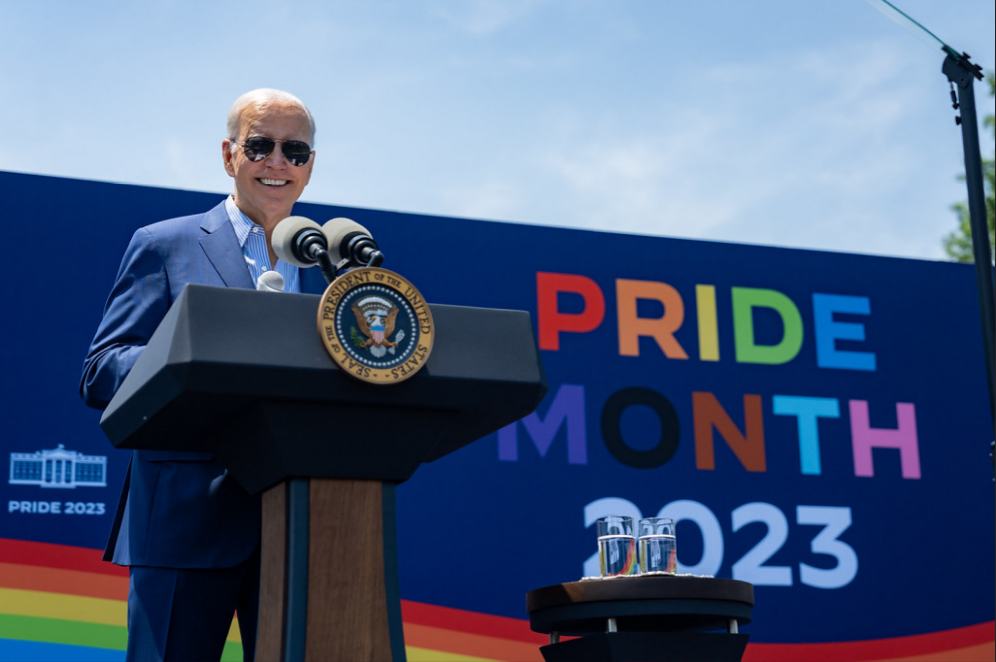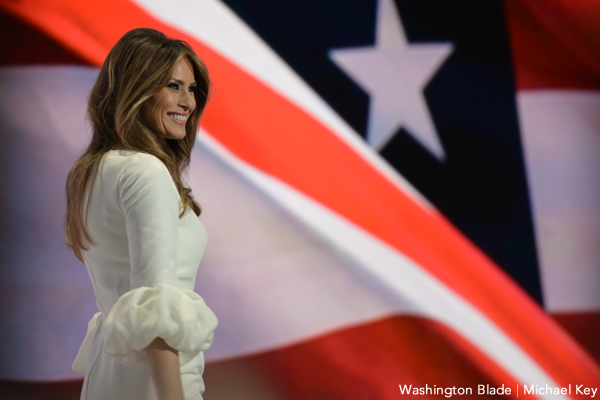Politics
Trump addresses Log Cabin Republicans at Mar-a-Lago gala
LGBTQ GOP group doubles down on support of former president

Former President Donald Trump addressed an audience gathered at his Mar-a-Lago club and estate in Palm Beach, Fla., Thursday night for the Log Cabin Republicans’ Spirit of Lincoln gala, the conservative LGBTQ group’s flagship event.
“We are fighting for the gay community, and we are fighting and fighting hard,” Trump said.
“Last night, we had over 450 LGBT conservatives and our straight allies join us for another amazing Spirit of Lincoln gala,” Log Cabin Republicans President Charles Moran told the Washington Blade.
“While the speakers and award honorees spanned the conservative spectrum, all of them, including President Trump, articulated a deep appreciation for our community and committed to our broader inclusion and support for gay rights,” Moran said, adding, “This is the bar we’ll be holding all GOP candidates to in 2023 and 2024.”
Last year, the Log Cabin Republicans honored Melania Trump with its Spirit of Lincoln award, citing her work combatting bullying in her role as first lady.
However, the group’s support of the former president, his family and his administration has not come without controversy — even among members of its own leadership, prompting Jerri Ann Henry to resign from her position as executive director in 2019.
Log Cabin Republicans’ embrace of Trump also comes amid fractures that have perhaps reemerged or deepened between LGBTQ conservatives and other factions within the GOP.
This summer, the group’s Texas-based chapters were rebuffed by the state’s Republican Party, which denied their requests for space for a booth during the party’s annual convention and called homosexuality “an abnormal lifestyle choice” in its official platform.
The move recalled incidents in the late 1990s when the Log Cabin Republicans were labeled pedophiles and compared to the Ku Klux Klan by Texas GOP leaders who denied the group’s requests to host booths at their conventions.
The dangerous smear linking LGBTQ people to child sexual abuse and exploitation is once again ascendant on the right, propagated by many of Trump’s political allies.
Members of Log Cabin Republicans’ San Antonio chapter joined a protest of a family-friendly drag performance Tuesday night in which patrons and organizers of the event were accused of “grooming” children for abuse.
“I don’t know anything about the drag protest or any involvement our chapter had in it,” Moran told the Blade.
Moran sought to draw a contrast between the Trump administration’s positions on LGBTQ issues and the treatment of his group this summer by GOP officials in Texas, writing in a USA Today op-ed that the former president is “a leader of LGBT inclusion.”
“It’s difficult to understand just how game-changing Trump’s presidential campaigns and presidency were for LGBT conservatives, who were suddenly included as welcome members of the party after decades of being sidelined,” wrote Moran.
The positions held by Moran and the Log Cabin Republicans differ sharply from those held by LGBTQ organizations and LGBTQ Americans more broadly — at least, as evidenced by the percentage of LGBTQ voters who supported Trump in the 2016 and 2020 presidential elections.
One of the first actions President Joe Biden took after taking office last year was to repeal the Trump administration’s ban that prohibited thousands of transgender Americans from enlisting and serving in the armed forces.
Following Trump’s announcement of his plans to run again in 2024, GLAAD released a statement arguing that the former president’s record was “defined by anti-LGBTQ actions and rhetoric and policy that empowered white supremacists and fueled racism, xenophobia, antisemitism and misogyny.”
The group pointed to its “Trump Accountability Project,” which, it wrote, “tracked the Trump administration’s attacks against the LGBTQ community, documenting more than 200 negative policies and dangerous rhetoric against LGBTQ Americans during his presidency.”
The Human Rights Campaign, meanwhile, has listed the Trump administration’s harmful policies and positions concerning LGBTQ people in categories ranging from healthcare and education to representation and foreign affairs.
Politics
First lady warns Trump is ‘dangerous to the LGBTQ community’ at HRC event
Jill Biden spoke in Arlington, Va., on Friday

Delivering a keynote address at the Human Rights Campaign’s Equality in Action event Friday, First lady Jill Biden warned former President Donald Trump is “a bully” who is “dangerous to the LGBTQ community.”
Her appearance at the three-day volunteer and board gathering at the Sheraton Pentagon City in Arlington, Va., comes as part of the Biden-Harris reelection campaign’s “Out for Biden” program, which aims to “mobilize LGBTQ+ voters, communities, and leaders across the country.”
“Today, this community is under attack,” Biden said. “Rights are being stripped away. freedoms are eroding. More and more state laws are being passed targeting this community. Just last month, we had to fend off more than 50 anti-gay amendments that Republicans tried to force into the government funding bill.”
“These were extreme measures aimed directly at this community — measures that would have limited health care and weakened protections for same sex couples,” she said. “And they served only one purpose to spread hate and fear.”
In a nod to her long career as an educator, Biden said, “History teaches us that our rights and freedoms don’t disappear overnight. They disappear slowly. Subtly. Silently.”
She continued, “A book ban. A court decision. A ‘Don’t Say Gay’ law. One group of people loses their rights and then another. And another. Until one day you wake up and no longer live in a democracy … This is our chapter of history and it’s up to us how it ends.”
Biden then highlighted some of the advancements for LGBTQ rights secured under the Biden-Harris administration.
“Thanks to President Biden, marriage equality is now the law of the land,” she said. “He ended the ban on gay and bisexual men donating blood. He’s made it possible for trans Americans to serve openly and honorably in our military. And he’s standing firmly against conversion therapy.”
“Yes, there are forces outside these walls that are trying to erase these hard fought gains, trying to unwind all the progress that we’ve made,” Biden said. “They want to take our victories away, but we won’t let them. Your president will not let them — I will not let them.”
Politics
‘Out for Biden-Harris’ LGBTQ-targeted campaign is launched
Several events planned in coming weeks

The Biden-Harris campaign on Wednesday debuted “Out for Biden-Harris,” which is a “national organizing and engagement program to mobilize LGBTQ+ voters, communities, and leaders across the country.”
Out for Biden-Harris “will train supporters to organize within their own networks and leverage messengers from the community to ensure we are meeting LGBTQ+ voters where they are,” the campaign wrote in a press release announcement.
“From drag queens to elected leaders to LGBTQ+ faith leaders, Team Biden-Harris will use a wide range of validators to communicate what’s at stake for the LGBTQ+ community in this election and why it’s critical that we vote for Joe Biden and Kamala Harris.”
The campaign also previewed some of the events and initiatives in coming weeks, which will include:
- A virtual organizing call featuring actor Wilson Cruz, Congressman Robert Garcia, HRC President Kelley Robinson, to mobilize LGBTQ+ supporters;
- A series of virtual relational organizing trainings focused on activating and reaching new volunteers targeting battleground voters. The campaign will be engaging trusted messengers, including high-profile and trusted messengers in the LGBTQ+ community, like Brita Filter, Danica Roem, Gina Ortiz Jones, and Rev.
- Hosting a series of Out For Biden-Harris house parties and community events including events in Phoenix, Arizona, Ferndale, Michigan, Milwaukee, Wisconsin, Philadelphia, Pittsburgh, and Harrisburg, Pennsylvania, and Las Vegas, Nevada to mobilize supporters.
- First Lady Jill Biden will be a featured speaker at the Human Rights Campaign Equality In Action Conference bringing together a network of 400 organizers and activists in Arlington, VA.
The campaign noted that LGBTQ voters will be “a key part” of its coalition, while 39 percent of voters consider LGBTQ equality a “make-or-break issue.”
“In 2020, nearly 11,000 LGBTQ+ volunteers mobilized to help elect President Biden and Vice President Harris,” the campaign wrote. “This year, Out for Biden-Harris will re-engage these supporters and build on their work. The program is designed around the idea that there is no better messenger to mobilize LGBTQ+ voters than their friends and neighbors to bring new supporters into our campaign.”
The Biden-Harris administration is the most pro-LGBTQ in history, and LGBTQ groups with a combined 3.8 million members have endorsed President Joe Biden’s reelection campaign.
However, “the fight for equality for all Americans is at stake this November as Trump and his allies plan to roll back the rights and freedoms of LGBTQ+ Americans,” the Biden campaign wrote. “Trump and his MAGA allies are running on an extreme, anti-LGBTQ+ agenda which would push to discriminate against the LGBTQ+ community, even going after the right to marry who you love.”
“LGBTQ+ voters are a force to be reckoned with. They were critical to our victory in 2020, and they will be critical to winning again this November,” said Biden-Harris 2024 Campaign Manager Julie Chavez Rodriguez. “That’s why we’re thrilled to launch Out for Biden-Harris, which will harness the LGBTQ+ community’s organizing prowess to reelect President Biden and Vice President Harris this November.”
Chavez Rodriguez continued, “LGBTQ+ Americans couldn’t have more at stake this election: Donald Trump and his extremist allies are running to gut LGBTQ+ rights and erase history as their top priorities. LGBTQ+ Americans deserve leaders who will fight for every American’s freedom and dignity. That’s what President Biden and Vice President Harris have done throughout their time in office, and what they will do if reelected, including pressing Congress to pass the Equality Act.”
“There has never been a more critical time to protect the rights of all Americans, no matter who you love or how you identify, and Out for Biden-Harris will be critical to not just safeguarding, but strengthening the rights and voice of every single American,” she said.
Politics
Melania Trump to host Log Cabin Republicans event
Former first lady is close with the group

Former first lady Melania Trump is back on the campaign trail with plans to host a fundraising event for the conservative LGBT group Log Cabin Republicans on April 20 at Mar-a-Lago, Politico reported on Thursday.
Funds will be used to support the group’s “Road to Victory” program, which will target voters in swing states. LCR has had a close relationship with Mrs. Trump, who was a special guest for its Spirit of Lincoln Gala in 2021, where she received the Spirit of Lincoln Award.
Politico reports that the host committee for this month’s event will include GOP donors Saul Fox, Amanda Schumacher, Bill White, Bryan Eure and Richard Grenell, who is gay and served as ambassador to Germany and acting director of national intelligence during the Trump administration.
“Melania Trump’s work as first lady, from helping children reach their full potential to championing a more inclusive Republican Party, has been historic,” LCR President Charles Moran said in a 2021 press release concerning the Spirit of Lincoln event.
“Her vocal support of Log Cabin Republicans has been a signal to Republicans everywhere that it is possible to simultaneously be conservative and support equality under the law for all Americans,” he said.
-

 Africa2 days ago
Africa2 days agoCongolese lawmaker introduces anti-homosexuality bill
-

 Colorado4 days ago
Colorado4 days agoFive transgender, nonbinary ICE detainees allege mistreatment at Colo. detention center
-

 Politics5 days ago
Politics5 days agoFirst lady warns Trump is ‘dangerous to the LGBTQ community’ at HRC event
-

 Books5 days ago
Books5 days agoNew book offers observations on race, beauty, love










